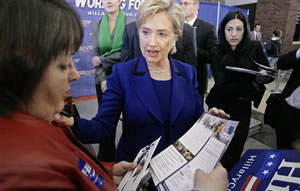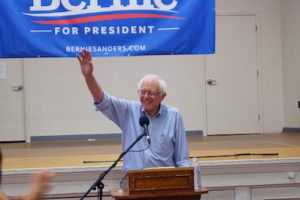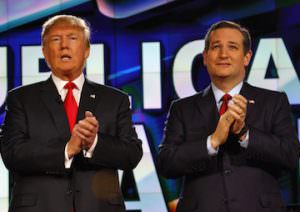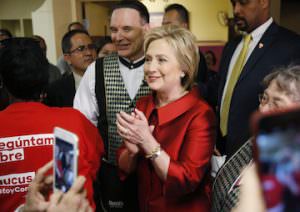The Iowa Caucus Con
Political reporters are not widely embraced, but in Iowa, they are eagerly welcomed when they show up to cover the state's unique system of selecting presidential nominees. The reason is simple: The media is a co-conspirator in a con, the Iowa caucuses.
DES MOINES, Iowa — This may be the last place in America where political journalists are embraced as heroes.
Usually these reporters, particularly those in the mainstream media, take hits from academia and a growing number of media critics. In Iowa, they are eagerly welcomed when they show up to cover the state’s unique system of selecting presidential nominees. The reason is simple: The media is a co-conspirator in a con, the Iowa caucuses.
I covered the first highly publicized Iowa caucuses in 1976, when unknown Jimmy Carter finished ahead of all the Democratic candidates and went on to win the Democratic presidential nomination and the presidency. We reporters found the unfamiliar system a welcome change from what we usually covered. Iowans were friendly and eager to talk, and the caucuses were peculiar but intriguing. After the caucuses, I moved on to the next stop, the New Hampshire primary, not giving any more thought to the Iowa system. That’s a reporter for you: Out of sight, out of mind.
In the intervening years, my career took a turn toward covering city councils, boards of supervisors, fixers, angry community leaders, lobbyists and the rest of the cast that makes local politics compelling. Down in the muck of real politics, I became more cynical. I learned that everybody has an angle, and you have to understand the system to know it for what it is. As I prepared to fly to Iowa on this current assignment, I wondered if I’d be able to figure out what the angle was for caucus participants.
I talked to a lot of people here, but oddly enough, I learned more from Iowa’s State Historical Museum, where there is a large display that explains a lot about the caucuses.
The exhibit tells the history: The caucus system was created in 1846, when Iowa entered the union, and took the form of a New England town meeting to decide political matters, such as picking national convention delegates.
Democrats and Republicans hold caucuses in each of the state’s precincts. These precinct caucuses choose delegates to a county convention. Nobody paid much attention to Iowa’s way of doing things until 1972, when some of the state’s sharpies moved up the date to January so their caucuses would be held ahead of the New Hampshire primary and would thus become the first presidential campaign test in an election year. Presidential candidate George McGovern jumped on the idea, did pretty well that year, and won the nomination. Carter did even better in the 1976 caucuses.
In another area of the museum, I found something more interesting: large cut-out figures of men and women. One looked as heroic as workers did in old Soviet Union statues. He was a reporter, dressed in a perfectly fitted brown sport coat, nicely cut blue jeans and brown loafers. His gray hair was cut short. He had a press pass around his neck and a pad and pen held loosely in his hands. I wondered how he managed to look so good, thinking of my own shaggy hair and heavy winter shoes, my clothes rumpled from being in a suitcase. This cut-out reporter, the accompanying text informed us, “has spent the last two presidential elections covering the caucuses and has discovered Iowa’s best Thai restaurant, martini, burger and round-trip airline schedule.”
Why was he being lionized? Why were his addictions to martinis and heavy food being praised? The answer came in a museum audio recording that explained, “The story of the Iowa caucuses needs to be told. It is our opportunity to shape the view of Iowa that gets reported and beamed around the world. It is the very best platform for the national and international press to experience the surprising things about Iowa that not always are shown.”
In other words, the caucuses are a promotional device, just like the Rose Bowl is a way for Pasadena to pitch itself to the world. The caucuses put Iowa on television, promoting the state to businesses like Google, which is opening a data center in Council Bluffs in 2009, a $200 million investment that will produce 200 jobs.
But the Rose Bowl is a football game operating under strict rules, with officials enforcing them. That’s not the case with the Iowa caucus system. The caucuses are a game with few rules and no real enforcement. I fault the media for not explaining this and for giving the false impression that the caucuses are an exercise in democracy.
Here’s how the caucuses work, as explained patiently to me by several participants, supplemented by my reading of the rules. Democrats and Republicans in each Iowa precinct hold a caucus. This is the first step in a long process. Any registered voter living in the precinct can attend. You can register at the door.
Remember this important point: The Democratic and Republican caucuses merely select delegates to county conventions, who pick delegates to district conventions. Participants at these events select representatives to the state convention, where the actual national convention delegations are chosen. So the highly publicized caucuses are merely the first step in a long process that is unimportant nationally because Iowa has relatively few delegates at the national conventions.
The Republicans’ system in Iowa is pretty straightforward. Their precinct caucus opens with a secret ballot straw poll on the presidential candidates. The caucuses then pick delegates to the county convention. The results of the secret ballots are phoned in to Republican state officials in Des Moines, where they are tabulated and released to the media.
That’s not the case with the Democratic caucuses. Caucus attendees cast a vote for their candidate or vote “undecided.” Candidates not reaching the 15 percent mark are dropped, and their supporters are urged to vote in a second round for a stronger candidate. That’s where the bargaining starts.
The bargaining concept set my city hall mind working.
What if one of the candidate’s supporters was a city council member or some sort of commissioner? Couldn’t a commissioner, trying to switch a vote, mention to a caucus-goer: “You know that garage conversion permit you’re having trouble with? Don’t worry about it.” When I outlined this scenario to a prominent Democrat, she said it would be illegal. But, she added, it wouldn’t be illegal for the commissioner to remind the caucus-goer that he had taken care of the garage matter. People tell me about promises of lawn care, pet sitting, cookies and other goodies, big and small, being made during the vote-switching process.
The final tally from each caucus is based on a rather complex mathematical formula. Suppose that in a caucus of 100, Sen. Barack Obama got 49 votes, former Sen. John Edwards 32 and Sen. Hillary Clinton 19. The delegates would be distributed in this manner: Obama 5, Edwards 3, Clinton 1.
But as I pointed out earlier, the news you receive about the Democratic caucuses are not statewide totals, just the numbers of delegates sent to county conventions. It has no relation to actual support. In my mythical match, Obama’s five votes probably mean his organization did a better job in bringing people to the caucus.
I discussed my doubts with a sharp young journalist, Chase Martyn, managing editor of the Iowa Independent, one of the Web sites established around the country by the Center for Independent Media to promote independent online journalism. The Independent has citizen journalists — also known as part-timers — filing reports on the caucuses around the state, and Martyn does his own reporting. So it is a plugged-in operation.
I told him I didn’t think much of the caucus system. He likes it. “It forces candidates to compete in a state where it doesn’t take a lot of money to win,” he said. Face-to-face meetings between Iowans and candidates, as reported by the national media, help the nation “pick a good nominee and president.”
But the caucuses aren’t democratic, I said. “Nobody would say they are democratic,'” Martyn replied. “The sense I get [from Iowans] is that “‘this is the game, these are the rules of the game, and don’t argue about the rules in the middle of the game.”
But if political journalists were to explain the rules, the rest of America would know that the caucuses don’t mean much. They are a fraud, like “The Wizard of Oz.”
But explaining the rules is tough. I have spent a career describing complex budget formulas, health care plans and water projects. This is one of the hardest processes I have ever had to explain. It took a long time, and now that I am done, I have no idea whether my editors or readers will know or care what I am talking about.
But the media should try to shed light on the process instead of helping Iowa keep this promotional device alive. Unmask the wizard, journalists, and set America free from the shackles of the Iowa caucuses.
Your support matters…Independent journalism is under threat and overshadowed by heavily funded mainstream media.
You can help level the playing field. Become a member.
Your tax-deductible contribution keeps us digging beneath the headlines to give you thought-provoking, investigative reporting and analysis that unearths what's really happening- without compromise.
Give today to support our courageous, independent journalists.





You need to be a supporter to comment.
There are currently no responses to this article.
Be the first to respond.